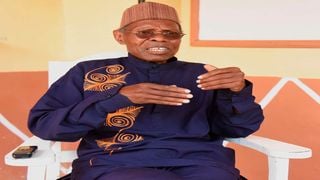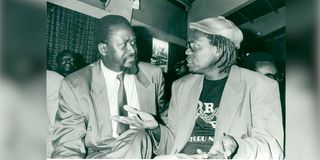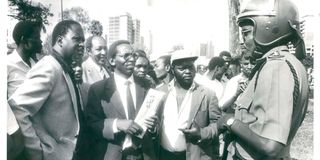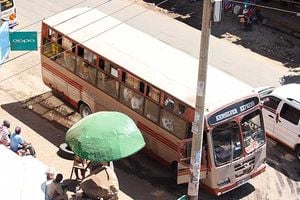
Koigi Wamwere during an interview with The Nation at his Sauti ya Mwananchi offices in Nakuru County on October 17, 2023.
| File | Nation Media GroupWeekly Review
Premium
Revealed: The ‘hidden’ Koigi Wamwere interview that ‘exposed’ Raila Odinga
What you need to know:
- While in exile in Norway, Koigi wa Wamwere told British broadcaster that, together with Raila Odinga, he was part of a radical group that was seeking to overthrow President Daniel Moi’s government.
The British Broadcasting Corporation (BBC) attempted to hide the tape and transcript of their interview with Koigi wa Wamwere on September 26, 1988 out of fear that it could cause more trouble for opposition leader Raila Odinga who was in detention, the Nation can reveal today.
According to recently declassified documents in London, the interview took place just a month after the arrest of Mr Odinga, who is now leader of the Azimio la Umoja One Kenya opposition coalition.
Mr Odinga had been picked up by plainclothes policemen and placed in indefinite detention without trial under the Public Security Regulations. He had been out for just six months after serving a prison term of five years for his alleged participation in the 1982 coup attempt against President Daniel Moi.
In a telephone interview from Oslo, Norway, where he was living in exile , the former Subukia member of Parliament had told Robin White of BBC’s Focus on Africa that he was among the leaders of a radical opposition movement called Kenya Patriotic Front (KPF) whose main aim was to overthrow President Moi’s Kanu regime.
“I belong to the leadership of KPF but we don’t have hierarchical leadership, I just happen to be one of its spokesmen,” Koigi told the BBC on phone. “We are seriously thinking about organising a military wing if the Kenyan government is not going to concede to the democratic demands for the people to have freedom and democracy.”
When Mr White went on to inquire whether Mr Odinga, who had just been arrested in Kenya, was also a member of KPF Mr Wamwere was categorical.

Birds of a feather? FORD Kenya’s Raila Odinga (left) listens to Koigi wa Wamwere at the All Saints Cathedral where they met for the Release Political Prisoners Cultural Week.
“Now the other name that has recently cropped up is Raila Odinga son of former Kenyan Vice-President Oginga Odinga ... Is he a member of the movement?” Mr White asked. “His movement, KRM, has just been affiliated to our movement, so in a sense, yes, he is a member of KPF,” replied Mr Wamwere.
The interviewer then sought to know whether Mr Odinga’s arrest had anything to do with the movement, to which Mr Wamwere replied: “I don’t know, but that is what I would suspect, and again, I would like to add that it is very wrong for the government to jail people just because they belong to an underground movement .”
The interview took place just when Sir John Tusa, the managing director of the BBC World Service, was preparing to travel to Kenya. There were rumours within the British broadcaster that apart from making things worse for Mr Odinga, the interview could also spoil the visit, especially after the Kenyan government sent a protest to then British High Commissioner to Kenya Sir John Johnson , accusing BBC of giving Mr Wamwere a platform to air his radical views.
“Grateful for the full text of this interview as soon as possible. It sounds as if the BBC action in interviewing Koigi might cast some blight over Tusa’s forthcoming visit. Koigi is seen as public enemy No1 (in Kenya) at the moment,” read a confidential telegram from Sir Johnson to the Foreign Office in London.
The recently released documents, marked “restricted”, reveal that on September 30, 1988, just four days after the interview, Mr Bell, a senior editor with BBC, Mr Tusa and Mr White held a meeting at BBC World Service headquarters’ at Bush House to discuss the matter. During the meeting the BBC made it clear that it had no apology to make for having interviewed Mr Wamwere, arguing that the credibility of their editorial output required that they cover the spectrum of Kenyan opinion.
However, they had one concern about it; that it could put Mr Odinga, who was already in prison, into more trouble.
Acting on the request of Sir Johnson, the Foreign and Commonwealth Office wrote to the BBC demanding the tape and the transcript of Mr Wamwere’s interview. The BBC, while providing the requested items, were quick to plead that the information should not be shared with Kenyans because it could lead to Mr Odinga being subjected to extreme torture in prison.
Therefore, while preparing to forward a copy of the transcript of Mr Wamwere’s interview to the British High Commissioner in Nairobi, who was trying to solve the matter with the Kenyans, Mr Richard Muir, the head of the information department at the Foreign and Commonwealth Office was firm in his instructions.
“The BBC recognised that this could put the man (Raila) in danger. Mr Bell therefore asked that the tape and the transcript, which he was sending to me , should not be handed over to the Kenyan authorities,” he wrote.

Chief Inspector Ikonya of the Nairobi Central Police Station, Nairobi, explains to members and suporters of the Release Political Prisoners pressure group, who included FORD Kenya’s Langata MP Raila Odinga (left) why they were not allowed to plant trees at Freedom Corner to commemorate Political Prisoners Day. Others were Murugi Kariuki, Victor Wachira, Kang’ethe Mungai, Karimi Nduthu, Kitur arap Tirop, Geoffrey Kuria Kariuki, Rumba Kinuthia, Labour Democratic Party chairman Noor Mohamed and physician Lukas Munyua.
Also Read: 60 years of Kenya's electoral mischief
At some point, the BBC had feared that the post could leak the information, but Mr Muir told them he did not think so.
Mr Tusa was also to carry a tape and transcript of the interview to Nairobi, but he was not to hand it to the Kenyan officials . He was also not to issue an apology for the interview but to recognise the impact of Mr Wamwere’s remarks, which antagonised Kenyan authorities.
Meanwhile, officials at the Foreign and Commonwealth Office were critical of BBC’s desperation to limit the effects of the interview, describing it as “trying to close the stable door rather late in the night”.
In a telegram dated October 6, 1988, and marked confidential, an official wrote : “Raila is, of course , in detention and it is unlikely that the broadcast will make much difference to the attitude of the Kenyan authorities towards him. We also know that Moi personally heard the broadcast. The BBC are therefore trying to close the stable door rather late in the day.”
The Foreign Office was equally not happy with Mr Wamwere, whom it wanted to be blocked from entering Britain because of his radical views.
Mr Odinga was released the following year in June, only to be detained again in July 1990. Three months later on October 8, 1990, Koigi was arrested as he prepared to enter Kenya from Norway through Uganda, and charged with treason. He remained in detention until March 1991 when he appeared before Chief Magistrate Omondi Tunya for his committal trial.
In June 1991, Mr Odinga was seriously sick at Naivasha Prison. He was set free towards the end of that month after Amnesty International made an urgent appeal for his release on medical grounds. But his attempts to travel abroad for medical tests for suspected heart disease were thwarted .
Three months later, on August 12, 1991, he called for the resignation of Moi and the establishment of an interim government. It didn’t take long before he began complaining about harassment by State agents. At a press conference he held on October 15, 1991, he told journalists how plainclothes policemen had stormed his office, and how he had received anonymous death threats on his phones.
A couple of weeks after this, he fled to exile in Norway via Uganda, returning in 1992 to contest in the multiparty election that marked his debut in elective politics.
- Opiyo is a London-based Kenyan journalist and researcher.





